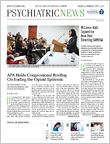The death of a loved one can cause significant stress for those grieving, increasing the risk of adverse mental and physical health outcomes. A study published March 22 in JAMA Psychiatry shows that for people who lose a spouse to suicide, the risk of adverse mental and physical health outcomes may be even greater.
“With close to 45,000 suicide deaths in the United States every year, there is increasing recognition of this public health problem,” said study co-author Yeates Conwell, M.D., a professor of psychiatry and co-director of the Center for the Study and Prevention of Suicide at the University of Rochester Medical Center. “However, the toll that suicide takes on the loved ones left behind has received much less attention,” he told Psychiatric News.
The findings highlight the importance of personal and professional interventions for people whose lives have been impacted by the death of a spouse or partner to suicide.
Conwell and colleagues used national registries from Denmark to identify and gather information on 15,607 people aged 18 and older who had lost a partner or spouse to suicide since 1970. The researchers analyzed data on the health of the surviving partners from 1980 to 2014—comparing outcomes with those who lost partners to causes other than suicide and those reported in the general population.
The researchers found that compared with the general population, people who lost a partner to suicide were at greater risk of all mental disorders, including mood disorders, posttraumatic stress disorder, anxiety, alcohol use disorder, and self-harm within five years of the loss (men: incidence rate ratio [IRR], 1.8; women: IRR, 1.7). The group also had higher risks for developing mental disorders than spouses who lost partners to causes of death other than suicide (men: IRR, 1.7; women: IRR, 2.0); with mood disorders (men: IRR, 1.7; women: IRR, 1.3) and PTSD (men: IRR, 5.6; women: IRR, 3.6) particularly heightened.
“While previous studies have linked spousal suicide to depression and death by suicide, the current study extends our knowledge of which mental disorders might arise after the suicide of a spouse,” the authors wrote.
Those bereaved by suicide were at a greater risk of death than the general public and those who lost a partner to death unrelated to suicide. Most notably, the suicide rate was higher among the spouses of those who had died by suicide, with a marked increase in risk within the first five years after the initial suicide.
“Right now, we know that those who remain behind following a spouse’s suicide carry as a group increased risk for greater disease burdens and for premature mortality compared with peers,” Eric Caine, M.D., a co-director of the Center for the Study of Prevention of Suicide at the University of Rochester Medical Center, wrote in a related editorial. “Thus, they deserve sustained attention beyond support during their time of acute grieving to promote health and to stave off potentially predictable, longer-term adverse consequences.”
The study was funded by the American Foundation for Suicide and Prevention and the Danish Health Insurance Foundation. ■
An abstract of “Association Between Spousal Suicide and Mental, Physical, and Social Health Outcomes” can be accessed
here. The accompanying editorial, “Does Spousal Suicide Have a Measurable Adverse Effect on the Surviving Partner?,“ is available
here.

